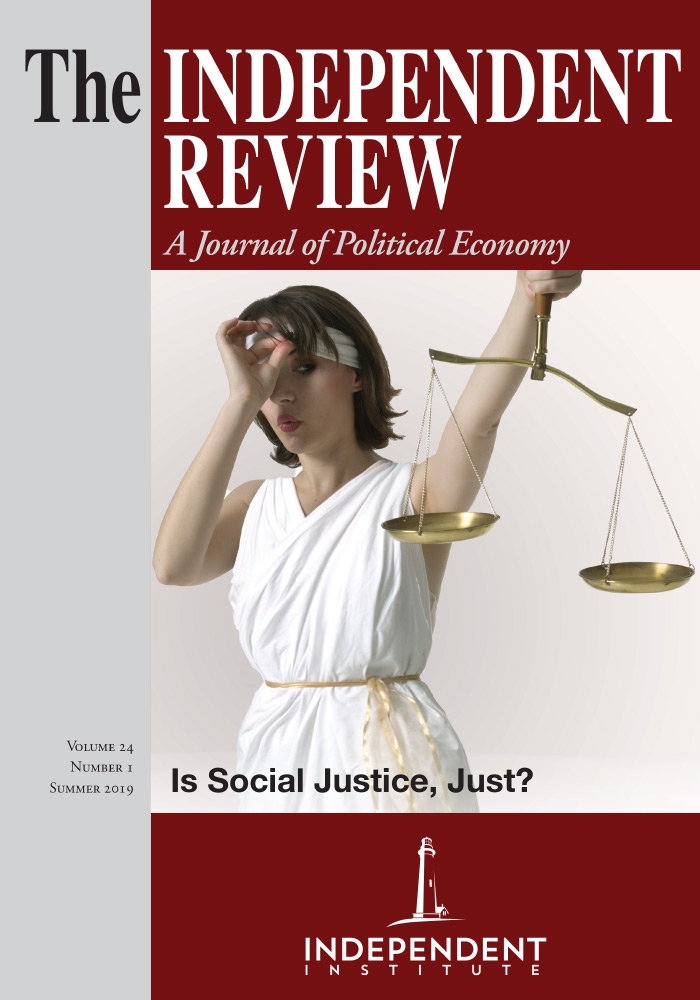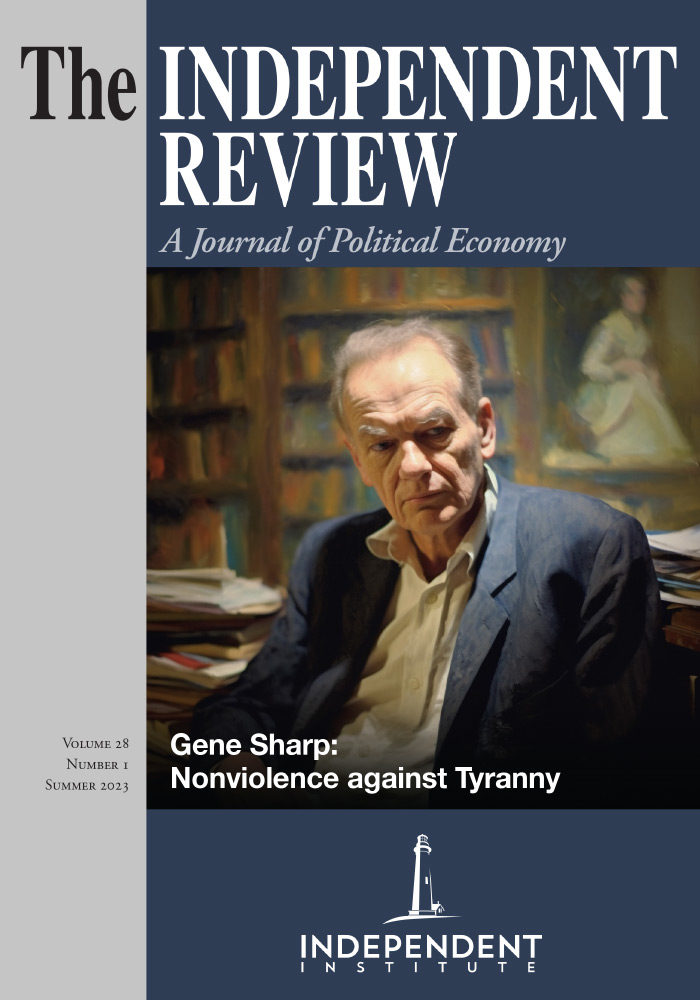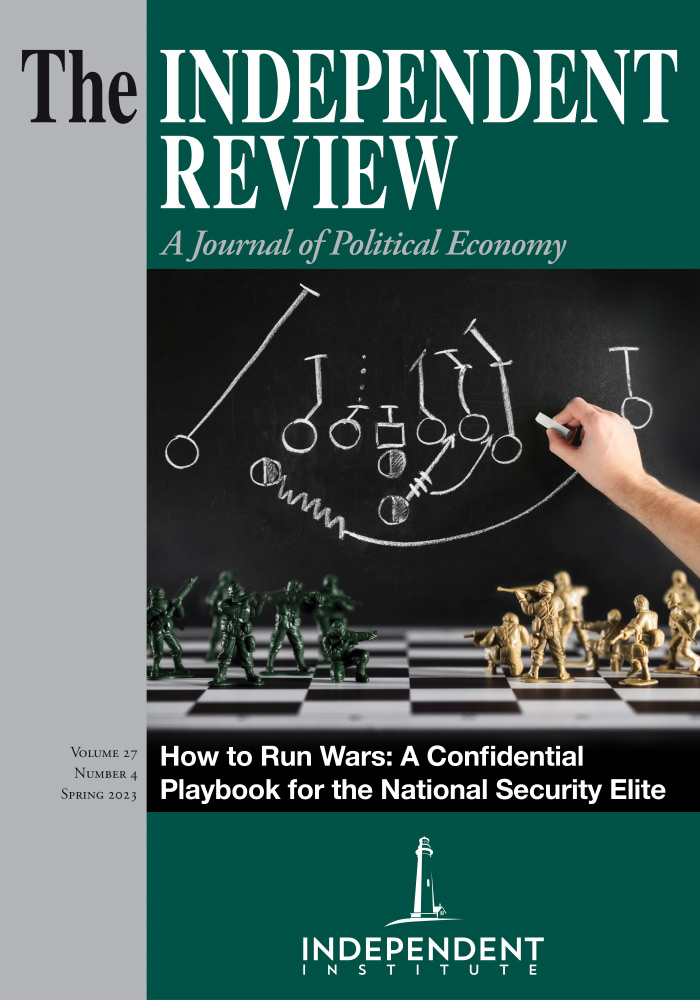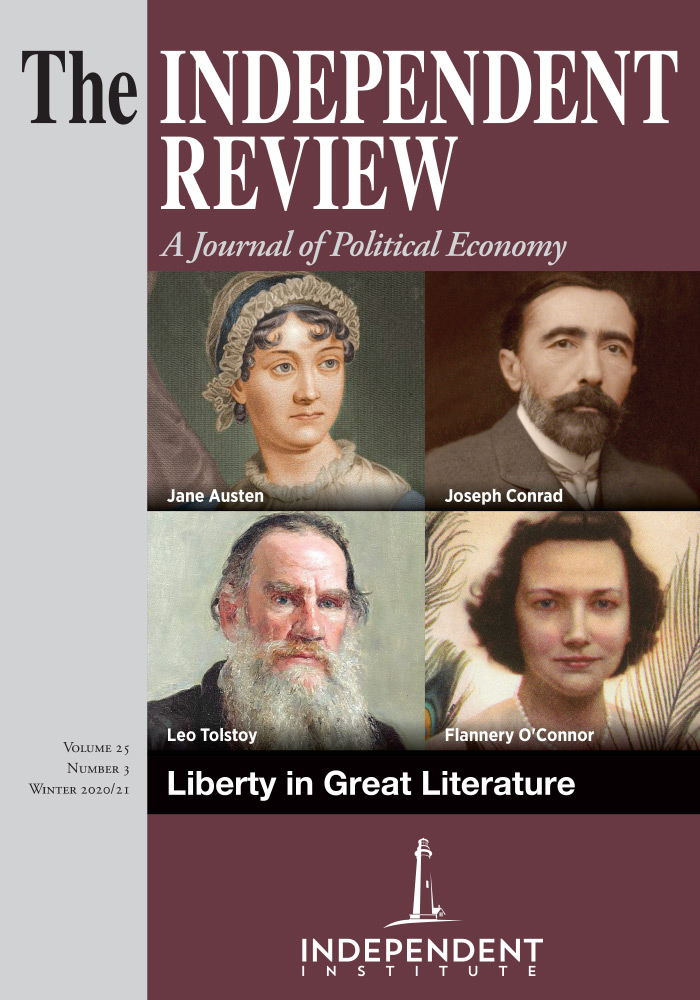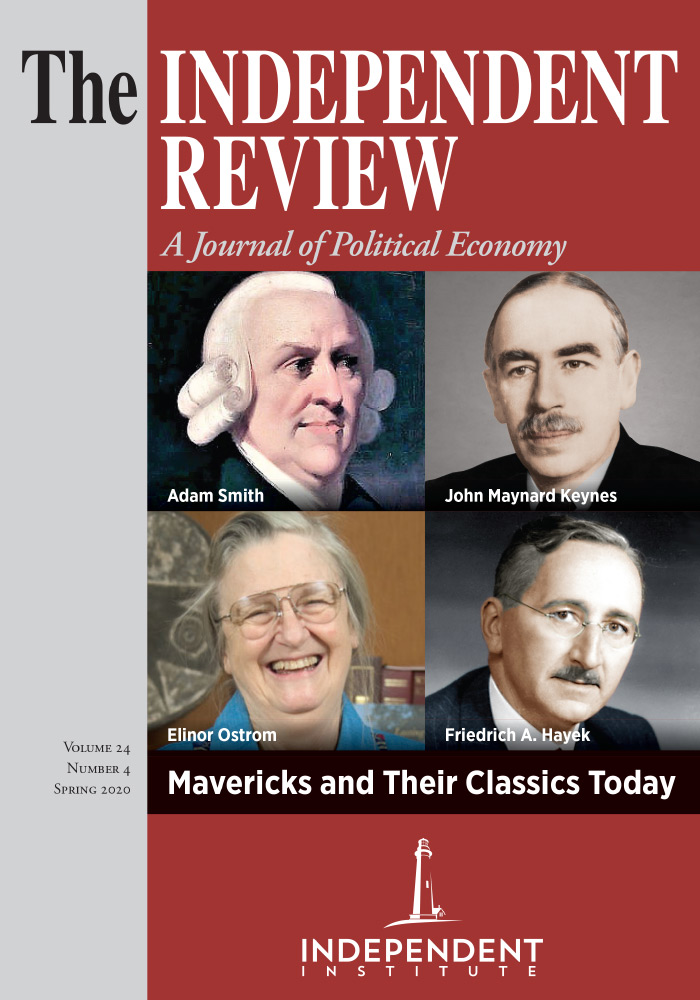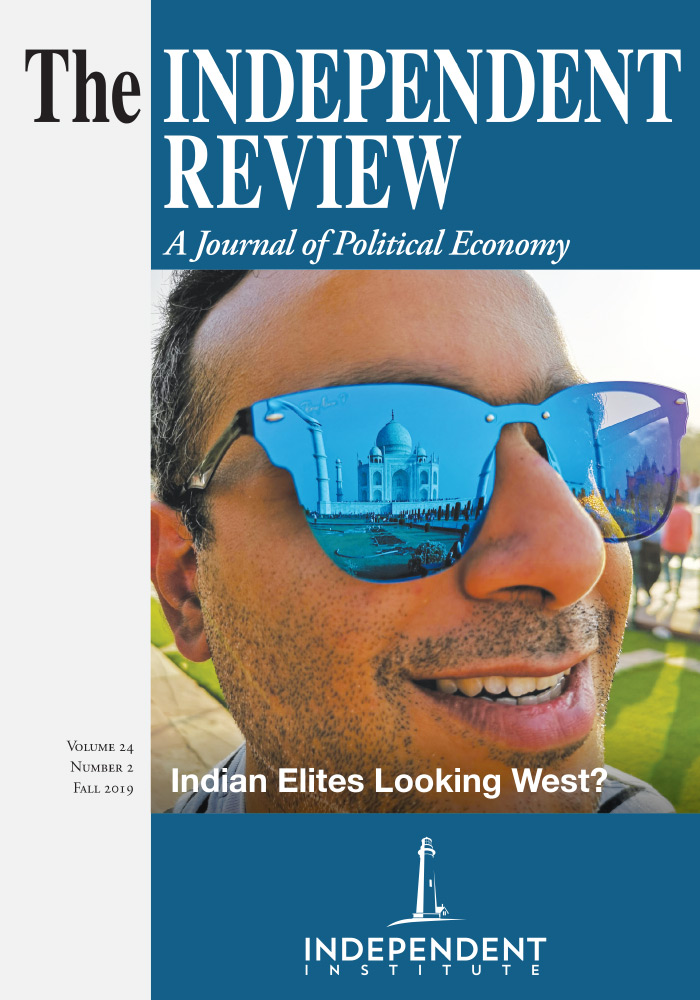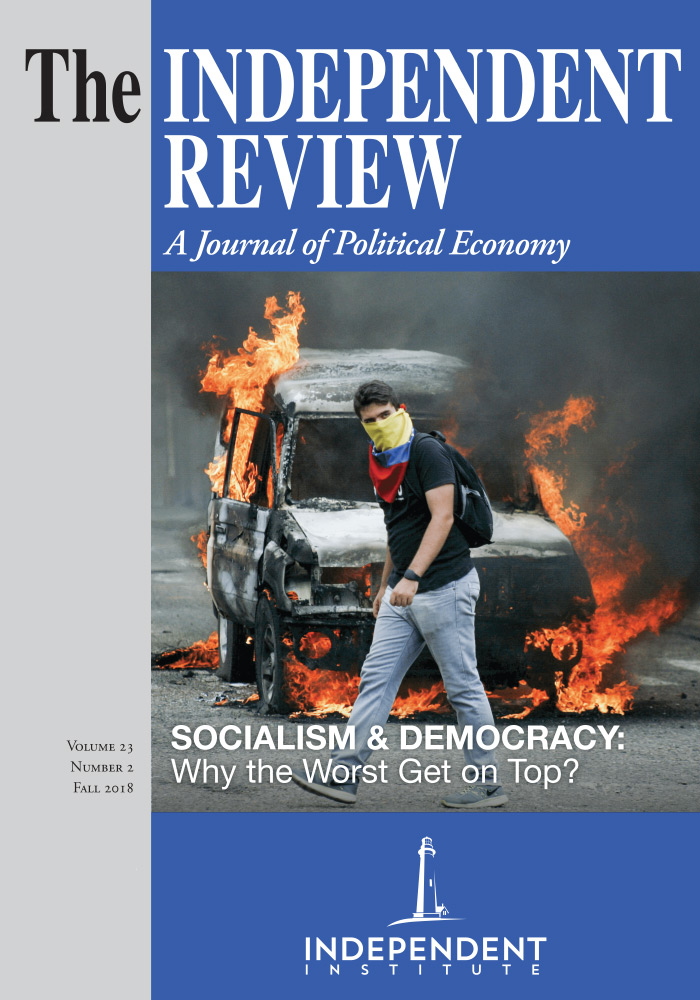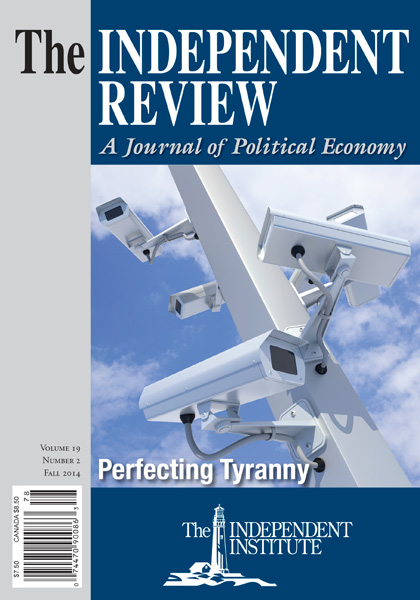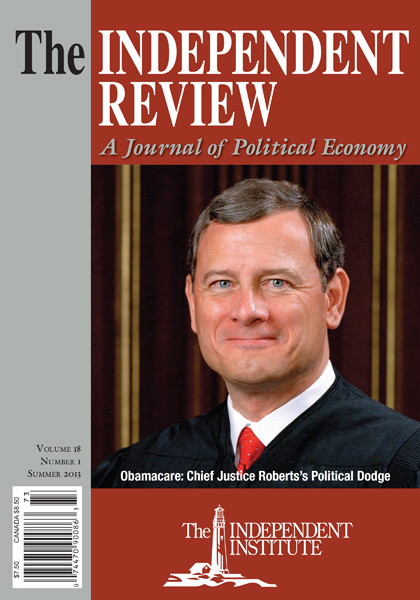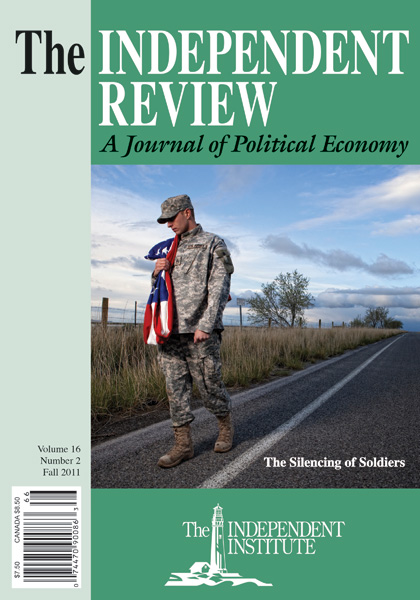Advocates of social justice falter when their proposals blur the distinction between inequality caused by luck, inequality caused by choices that people are entitled to make, and inequality caused by choices made by people who are not entitled to make them. Perhaps the most important policy that social-justice advocates should endorse is a classical liberal opt-out provision: our right to refuse any proposal, request, or demand from those whose behavior and choices clash with our own values.
Article
Because “social justice” allegedly makes the mistake of maintaining that the “results of the spontaneous ordering of the market” are instead the result of “some thinking being [having] directed them,” F. A. Hayek argues that it is worse than a conceptual error: it is “nonsense, like the term ‘moral stone’” (1976, 62, 78). Hayek may have thought he put a stake through the heart of all talk of social justice, yet reference to and use of the term social justice have not abated since he wrote these words; if anything, they seem to have increased. Hayek has a point that neither formal nor informal institutions enforce themselves and that the patterns of choice and allocation of resources that we see in fact result from the decisions of individuals—who are therefore individually, not collectively, accountable. Nevertheless, his insistence that we may criticize only individuals’ particular decisions, not the overall results of many individuals’ decisions, seems like idiosyncratic preference—in other words, prescriptivist, even rationalistic. The meaning of terms is determined by their use, and although we may stipulate a term’s meaning based on consistent use or for the sake of argument, no one has the authority to fix, once and for all, the meaning of any term. Unfortunately for Hayek, then, the discussion of social justice is not closed.
In this brief essay, I propose to do three principal things. First, I provide a bit of background for why discussions of social justice often seem inconclusive. I then indicate why we should care about social justice, despite recurring definitional difficulties, and point out what I take to be some confusion in discussions of social justice. Finally, I draw on some arguments David Hume and Adam Smith offer in support of a commercial society to propose and defend my own conception of social justice.
Background on Social Justice
Hayek’s discussion of social justice seems to generate a problematic not unlike what Plato describes in Euthyphro. Socrates was on his way to stand trial for impiety and corruption of youth, a trial for which, if found guilty, he could face anything from fines to exile to execution—and, of course, Socrates was ultimately convicted and put to death. The philosophical action of Euthyphro centers on Socrates’s discussion of the notion of piety with the young man Euthyphro. Euthyphro is bringing his father up on charges of impiety—which could have similarly grave potential outcomes for his father if convicted—and so Socrates suggests that because Euthyphro is taking such an extraordinary step regarding his own father, then Euthyphro must know what impiety is. Socrates professes not to know what piety and impiety are, and because he, too, is facing a charge of impiety, he proposes to make himself Euthyphro’s “pupil” in the hopes of coming to understand exactly what he is up against (Plato 2002, 5, 5a). There ensues an examination of several possible definitions of piety and impiety, all of which are found wanting. The dialogue ends with Euthyphro tiring of the embarrassment he suffers at Socrates’s hands for not being able to produce a sound definition. Though Socrates wants to continue the discussion, Euthyphro decides simply to leave, and the dialogue ends inconclusively.
In later writings, Plato would articulate explicitly what is implicit in Euthyphro—namely, that for each term there is a single eternal essence, an Ideal or Form, from which the term gets itsmeaning and to which all proper uses of the term must refer.[1] If one is skeptical, however, about the existence of Platonic unchanging transcendent anchors for terms, then Hayek’s criticism of the use of the term social justice begins to ring hollow. It sounds more like a plea to use justice the way he would prefer because he prefers not to use social justice at all. Fair enough, but others might have different preferences.
Nevertheless, there seem to be two recurring problems facing contemporary discussions of social justice. The first is that there is in fact no generally accepted, standard definition of the term. People apply the term social justice to many different things and to different kinds of things, so in arguing about it, they often end up talking past each other. The second and potentially weightier problem is that many of the various applications of the term do connect to and rely on one particular aspect of a standard conception of justice—namely, that it implies enforcement. So the issue concerns not just differences of opinion about how resources should be allocated, what virtue requires, what public institutions we should have, or how people should be treated. Rather, the issue is that the use of the term social justice, like the use of impiety in Socrates’s time, entails either applying coercive mechanisms to enforce one view over another or endorsing punishment for incorrect behaviors or outcomes. The latter problem raises the stakes of the discussion: if something is a failure of social justice, then that means someone should be punished or made to pay. But if we are considering taking the significant step of punishing people or making them pay, then the former problem—definition—becomes more acute as well: we had better know what we are punishing or making them pay for.
Why Care about Social Justice?
There are many things one might find disagreeable in the world; some of them one might even consider unjust. An example of the latter might be the presence of large inequality: some countries are richer than others, and some people are richer than others. In some cases, the differences in wealth are huge: one hundred to one, one thousand to one, and even greater. A natural question is “Why?” Why are some countries richer than others? Why are some people richer, so much richer, than others?
But the question “Why?” has at least two senses. It might mean “How come?” and it might mean “What for?” The two are not the same thing. “How come?” asks for a process explanation: What are the historical mechanical or chemical or biological (etc.) causes that brought the situation, circumstance, eventuality (etc.) in question into being? By contrast, “What for?” asks for an intention explanation: Why did people do what they did?[2] The former, in other words, typically asks for a descriptive, empirical explanation involving no intent; the latter asks for a purposeful explanation of intent. The former, not being subject to rational action or autonomous judgment, admits of no moral judgment: it just is. (Why does the earth revolve around the sun? Because of gravity. Why is there gravity? Because there is.) The latter is the result of someone’s—or of several someones’, sometimes acting in concert or coordination, sometimes not—taking deliberate action that he or she or they could have chosen not to take: it is a result of moral agency and thus admits of moral judgment. (Why was the bank robbed? Because that person or those people chose to rob it.)
It is important to keep these two categories of “why” questions separate. Otherwise, one runs the risk of categorical confusion. It can lead us to ask the “What for?” behind blind physical processes (processes, in other words, for which there is no “What for?”) and to ascribe purpose and intention where none exists. Sometimes things happen unpredictably and unforeseeably, and no one is to blame (or credit). Why did the tornado strike here? Why did the hurricane strike then? Why did the flash floods hit exactly when the group of Thai soccer players happened to be hiking, stranding them inside a flooded cave? If by asking “Why?” we want to know the physical causes of what happened, these causes can often be retrospectively reconstructed. Sometimes, however, we are seeking an intentional, purposive answer to “Why?” though none exists. Sometimes our desire to find someone to blame for what has befallen us or others is so strong that we impute deliberate reasons even when none exists. Telling someone “it was bad luck” seems weak and unsatisfying, so we often find ourselves inclined to target some person, persons, or Person to blame or credit.[3]
Discussions of social justice often betray conflation of or equivocation between these two different kinds of answers to the question “Why?”[4] They identify things that are displeasing (at least to their advocates) and ask, “Why?” Why is there so much inequality? Why do some deserving people not get what they deserve? These questions are fair, reasonable, and important to ask. The problem is that they are only the first level of question. The next is: Do deliberate human action and intentional choice explain and account for what we see, or was it luck? And if it was the former, was it the result of choices that the individuals involved were entitled to make, as free and responsible moral agents? We therefore have three categories: (1) luck; (2) deliberate choice that the relevant agents are entitled to make; and (3) deliberate choice that the relevant agents are not entitled to make. Only category (3) comprises the two elements required for negative moral judgment—the result of deliberate human agency and choice, choice the agents should not have made—and thus only category (3) warrants moral condemnation. Any claim to injustice hence must demonstrate that the situation in question results from category (3). In such a case, social injustice would be the collective or aggregate results of individuals’ choices that they should not have made.
It is important to note, however, that such a case is different from a collectiveaction problem, in which circumstances are such that people are incentivized to choose differently from how they otherwise would wish to, resulting in a signature of effects they did not want. In case (2), the overall results might not be what a third party prefers, but the first and second parties chose what they wanted and were entitled to choose. Third parties might face an externality—an effect on or change in their circumstances—that they did not choose or would not have chosen, but that by itself does not yet rise to the level of (punishable) injustice. If Jack and Jill decide to marry, but Joe wants to marry Jill, Joe’s circumstances have now changed for the worse as a result of Jack and Jill’s choice; unless an extenuating circumstance is present (such as a promise to or contract with Joe), however, Joe has no grounds for demanding compensatory action.[5] In case (3), the “social” aspect might arise from the presence of many people making choices they should not have made. In that case, the qualifier social before justice would indicate more widespread similar instances of injustice.
Much advocacy of social justice is compromised by its failure to distinguish category (3) from categories (1) and (2) or its failure to properly discount instances of (3) for the admixture of (1) or (2) or both. It often runs them all together: something of which I disapprove has happened or is the case; therefore, remedies are required. And if remedies are not voluntarily forthcoming, then “social justice” demands it—justice being the preferred term not only because it connotes both gravity and certitude (even self-evidence) but also because it licenses coercive enforcement if necessary.[6] If, however, there are many similar acts of injustice, and if, moreover, they are encouraged or condoned by one’s culture or institutions, then we may reasonably call such instances “social injustice” and seek to remedy not only the particular instances but also to condemn and even seek to change the culture and institutions.
Early Arguments for Social Justice in a Commercial Society
One way to think about what might constitute a conception of social justice builds on arguments in favor of a liberal political order and a commercial society that early political economists made. David Hume, for example, argues that commercial society encouraged an “indissoluble chain” linking industry, knowledge, and humanity. He claims that luxury is not necessarily a vice: “if a man reserve time sufficient for all laudable pursuits, and money sufficient for all generous purposes, he is free from every shadow of blame or reproach” ([1754] 1985c, 269). His argument is that the desire for luxury is really the desire to “enjoy . . . those pleasures which are the fruit of [one’s] labour” (270). This desire leads one to work hard—that is, to be industrious—to achieve those pleasures. But this labor requires one to develop skills, expand one’s knowledge, and thereby increase the stock of knowledge of mechanical and other arts. Importantly for Hume, this desire also leads people to engage and develop their sociability. Because human beings are relatively limited in their natural gifts—they have no wings, fur, or claws, for example—the primary way for them to get what they want is by cooperating with other humans. And the best way to cooperate with others is to offer them something in return, which requires us to think not only of our own wants and desires but also of others’ wants and desires. Hume argues that thinking of others leads us, even unwittingly, to become “more sociable” ([1754] 1985c, 271). The more cooperation in which we can engage, the more of our desires we stand a chance of satisfying; and we stand a better chance of getting others to cooperate with us if we act sociably rather than antisocially. Hume writes that people thus “flock into cities; love to receive and communicate knowledge; to show their wit or their breeding; their taste in conversation or living, in clothes or furniture” (271). “Particular clubs and societies are every where [sic] formed: Both sexes meet in an easy and sociable manner; and the tempers of men, as well as their behavior, refine apace” (271). On this basis, Hume concludes: “Thus industry, knowledge, and humanity are linked together by an indissoluble chain, and are found, from experience as well as reason, to be peculiar to the more polished, and, what are commonly denominated, the more luxurious ages” (271, italics in original)—that is, in commercial societies.
According to Hume, commerce also disperses wealth “into numberless hands,” who “employ it in the purchase of the common necessaries of life” ([1754] 1985a, 301–2), thereby increasing their prosperity. This increasing prosperity not only “serve[s] to the ornament and pleasure of life,” which is a benefit to individuals, but is moreover “advantageous to society; because, at the same time that they [that is, the ornament and pleasure of life] multiply those innocent gratifications to individuals, they are a kind of storehouse of labour, which, in the exigencies of state, may be turned to the public service” ([1754] 1985c, 272, italics in original). Thus, wealth can enable a country to better address large-scale public necessities, such as infrastructure, disaster relief, and even, when necessary, war. And Hume believes that the benefits of commerce reach beyond national borders: “I shall therefore venture to acknowledge, that, not only as a man, but as a BRITISH subject, I pray for the flourishing commerce of GERMANY, SPAIN, ITALY, and even FRANCE itself” ([1754] 1985b, 331, capitalization in the original). Even France! Hume continues: “I am at least certain, that GREAT BRITAIN, and all those nations, would flourish more, did their sovereigns and ministers adopt such enlarged and benevolent sentiments toward each other” (331). Hume’s argument thus has two main parts. First, commerce and trade, including in particular trade with people from other countries, lead to increasing material benefit and prosperity for all concerned because they are positive-sum transactions. Second, regular and mutually beneficial exchange with others softens our antagonisms toward them and can incline us to view others—even people from other countries, who speak different languages, have different cultures, and practice different religions—as opportunities instead of as enemies. This is Hume’s “enlarged and benevolent sentiments.”
Adam Smith makes a similar argument, as evidenced in the famous “invisible hand” passage from The Wealth of Nations ([1776] 1981, 456). There Smith argues that our natural desire to better our own condition leads us to seek cooperation with others in mutually beneficial ways—that is, ways that benefit others at the same time that they benefit ourselves. Now, according to Smith in Theory of Moral Sentiments, this can happen only within a “well-governed society,” which Smith defines as one that protects “justice”—that is, a society whose public institutions protect “the life and person of our neighbour,” each citizen’s “property and possessions,” and each citizen’s “personal rights, or what is due to him from the promises of others” ([1759] 1982, 84). When those three pillars of justice are protected, I am forestalled from getting what I want from others by enslaving them, stealing from them, or defrauding them. Thus, my only recourse is to make offers of voluntary cooperation, which others are free to decline if they so choose. Smithian justice protects others’ opt-out option, which disciplines me to consider their interests, not just my own; and my own opt-out option disciplines them to consider my interests, not just theirs. Thus, each individual’s desire to improve his own situation leads him, by an “invisible hand,” to “promote an end which was no part of his intention”—namely, to benefit others, indeed “to promote the publick interest” ([1776] 1981, 456). This argument for Smith is also twofold. First, individuals’ cooperative exchanges lead to increasing individual and overall prosperity. Second, the requirement that exchanges must be cooperative and thus voluntary leads to mutual respect. If I cannot coerce you or mandate that you exchange with me—that is, if you retain your opt-out option—then I must understand that my interests and preferences do not trump yours, that I am not more important than you. My need for your voluntary consent requires that in order to achieve my own goals I must consider your wishes, your desires and needs, and your values and obligations and constraints and that I must therefore show you respect. My own opt-out option means you must show me respect as well. A society that protects Smithian “justice” therefore requires and engenders mutual respect.
As both Hume and Smith well understood, however, a commercial society is not perfect. People make bad choices, even by their own lights, and they buy and sell things they should not.[7] They can be persuaded and even duped by persistent salespeople or clever marketing or be exploited by asymmetrical knowledge.[8] Commercial activity can lead to negative externalities, collective-action problems, and environmental degradation.[9] There will be material inequality.[10] Commercial society’s “creative destruction” is not only creative but also destructive—of community and of a sense of belonging, no less than of wealth.[11] Yet commerce, trade, and exchange have, as Hume and Smith predicted, improved our lives in many important ways. Billions of human beings now lead lives that their forebears could only have dreamed of. We live longer, healthier, and freer than ever before; in many parts of the world, the scope of opportunity is unprecedented; global rates of violence are at all-time lows; and the consensus against violence, racism, sexism, xenophobia, and other forms of discrimination is spreading.[12] Things are not perfect, and the improvements worldwide have been uneven, but by almost any objective measure conditions in the world are arguably better now overall than they have ever been, and there is considerable reason to be optimistic that the future will be yet better—with more improvement in the lives of ever more people.[13]
Perhaps even more important, however, is the dignity that such a society recognizes in each individual. Under the conception of “justice” endorsed by Smith, the only exchanges, trades, and partnerships allowed are those that are mutually voluntary. If each of us possesses an opt-out option—the right to say “no, thank you,” and go elsewhere—then no one, not even the least among us, may be coerced or mandated into a transaction that he or she does not want. That means that for any transaction to be successfully executed, each party must recognize—and respect—the other’s wishes, preferences, and values. Jeff Bezos, currently the richest person in the world,[14] might be able to offer me $1 billion to work for him, but as long as I can say “no, thank you,” and go elsewhere if I so choose, our agency is immediately leveled, and we meet each other as peers. Protecting this sacred right to decline any offer or proposal is respecting people’s dignity as free and equal moral agents. Indeed, one might argue that the bedrock moral principle of liberal political economy is both recognizing and exercising the right to say “no.”
A Proposed Conception of Social Justice
One way to think about social justice, then, is as requiring, first, the removal of formal restrictions placed on any individuals or groups that limit their ability to achieve a flourishing life as they themselves understand it. A second step would be endorsement of political and economic policy that rewards people for engaging in cooperative behavior and partnerships that provide benefit and value to others as well as to themselves—and that hence punishes or disincentivizes behavior that benefits one person or group at the expense of others. As conceived by Hume and Smith, a liberal political regime that protects the widest scope of liberty of all its citizens that is compatible with the equal liberty of everyone else seems a plausible way to accomplish or at least work toward the first of these goals; a properly functioning market economy seems a plausible way to accomplish the second.
What neither a liberal political regime nor a properly functioning market economy addresses, however, or at least not directly, is two remaining central concerns of many uses of social justice—namely, inequality and informal obstacles to achievement. Regarding inequality, I suggest a lexical priority: as long as there are some people who still face formal, legal restrictions—that is, as long as there are some individuals or groups who are accorded differing and reduced legal rights and privileges than others in society due to what should be irrelevant factors about them (such as race, sex, etc.)—then rectifying that different treatment is the first priority and takes precedence over concerns about material inequality. Only once everyone has the same maximally extensive package of rights and negative liberties protected should we turn our attention to whatever concerns remain about inequalities in wealth.[15] My argument for this priority is that interference with people’s negative liberties—the rights to be free from uninvited third-party interposition in their persons, to use their own justly acquired property as they see fit, and to order their lives according to their own schedules of value—is more destructive of people’s abilities to achieve flourishing lives of meaning and purpose than anything else. When some may intrude into others’ lives and coercively mandate or restrict their decisions, then a crucial part of their human identity, their moral agency, has been compromised. Thus, the first duty of any morally defensible liberal polity should be the default recognition of its citizens as full and equal moral agents capable of creating and entitled to create a life of meaning and purpose for themselves. Nothing else matters until this is the case.
Once that formidable task has been accomplished, I suggest that many worries about material inequality—though not all—will evaporate. A great inequality of wealth by itself cannot confer special power on the wealthier party as long as the less-wealthy party retains an opt-out option and the right to say “no, thank you,” to any offer, request, or suggestion. Inequalities in wealth rise to a level warranting political redress only when they are combined with an authority to mandate choices against others’ wills—but that, then, is an infraction of justice; the inequality itself is inert until it is joined with a coercive apparatus. Once the authority to coerce is eliminated, there may be other moral worries about material inequality that can arise—for example, the ability to seduce people into making unwise, or “noxious,”[16] choices with the lure of money—and we can safely turn our public attention to such cases once everyone’s basic negative rights and liberties are formally recognized and protected.
The remaining part of many social justice concerns, then, consists of informal obstacles to achievement. Perhaps a society has mores, conventions, or prejudices that, although not enacted formally through law or other public institutions, nevertheless are sufficiently widespread to result in disfavored individuals or groups having fewer opportunities than other (favored) individuals or groups. Given the lexical priority for which I have argued that individuals’ negative liberty should enjoy, any redress of informal obstacles to achievement must be pursued without infringing on this negative liberty. In most cases, that will mean that we should not use the coercive apparatus of law or policy to address them—in other words, they are not part of justice.
What recourses would that leave us, then? There are primarily two. First, the powers of speech, suasion, and association that the liberal polity ensures us. That is, we can condemn, including publicly, the mores, conventions, and prejudices that restrict the range of options available to the disfavored groups. We can make and publicize arguments demonstrating the moral failings of such informal restrictions. And we can refuse to participate in or cooperate or partner with organizations or projects or individuals who harbor or act on the objectionable prejudices. We can take our skills, our abilities, and our money elsewhere.
The second recourse we have to deal with such informal restrictions is the growing opportunities we have in a commercial society. One thing that happens in a properly functioning market economy is that people become wealthier. As wealth increases, our dependence on any one person or group for acquiring the goods and services we need and want and for partnerships and associations that contribute to the construction of lives of meaning and purpose decreases. In other words, wealth gives us options and therefore expands our independence. If this person will not hire me or if this company will not sell to me or if this group will not associate with or admit me, there are hundreds, even thousands, of others that will. In a perhaps surprising way, a market economy can enable people to capitalize on others’ prejudices—benefiting the former for refusing to indulge society’s prejudices and costing the latter for indulging theirs. This is especially important for the less advantaged in society, who often enjoy fewer options. As their wealth increases, their ability to chart a course for their lives that is consistent with their values—and that will include declining to associate, partner, or cooperate with organizations or people whose values are inconsistent with their own—increases. For the least advantaged in society, this greater ability can make a tremendous difference in their life prospects.
Conclusion
In a free society such as that envisioned by a Humean/Smithian liberal political order and market economy, people would not be formally (legally) punished for having prejudices or for refusing to partner with others, sell to others, hire others, and so on as a result of their prejudices. Respecting all citizens’ equal moral agency would entail respecting their right not only to believe what they wish to believe but also to make choices that we disagree with—even choices we find reprehensible. But it does not require that we condone those choices or, perhaps more important, support or enable them with our time, talent, or treasure. Perhaps the single most important right that social justice should endorse and advocate for is what I have called the “opt-out option”: the right to say “no, thank you,” to any person, no matter how rich or privileged, and to any offer, any proposal, any request, any demand. We may not command that others choose and behave the way we might prefer, but if we are secure in our persons, properties, and voluntary agreements, then we may dissent from approving or supporting others whose behavior and choices are inconsistent with our own schedules of value.
No human society will ever be perfect, of course, because it is composed of, administered by, and created by imperfect human beings. Perhaps the best that can be hoped for, then, is a relatively better society or perhaps even a least-bad society, given our imperfections. What a commercial society constrained by protections of liberal negative justice proposes is both increasing material prosperity and morally improved relations among increasingly many people: formal equality, though allowing material inequality, will encourage prosperity and better moral relations. Perhaps that is true social justice, and a system of political economy that encourages increasing prosperity for all (especially the least advantaged) and respects the dignity of each individual— captured in particular by recognizing and respecting everyone’s opt-out option—might constitute a conception of social justice worth defending.
Notes
[1] See, for example, Republic, bk. 5 (Plato 1992, 122–56).
[2] This distinction is a very old one. Aristotle would have said that the first calls for an “efficient” cause, whereas the second calls for a “final” cause (1984, 1:392–42). W. K. C. Guthrie (1975) not atypically calls the former a “materialist” explanation and the latter a “teleological” explanation.
[3] See Shermer 2002 and Thaler 2015.
[4] Maureen Linker, for example, argues that social justice involves the removal of undeserved “social privilege,” such as living in a country that officially recognizes one’s own (Christian) religion’s holidays or that presumes as “normal” or as a default one’s own sexual (heterosexual) orientation (2015, 45, 64–65). Özlem Sensoy and Robin DiAngelo define social justice as “the principles of ‘fairness’ and ‘equality’ for all people and respect for their basic human rights,” connect social injustice to “racism, sexism, and homophobia,” and then offer a list of opinions about these topics that they assert “are predictable, simplistic, and misinformed,” including “People should be judged by what they do, not the color of their skin” (2017, xix, 3). Brian Barry claims that “[s]ocial justice is about the treatment of inequalities of all kinds” (2005, 10), both those that arise by deliberate human agency and those that arise from chance, luck, or contingency. See also Tomasi 2012, esp. chap. 8, and Piketty 2014, esp. 479–81.
[5] See Otteson 2017.
[6] See, for example, Sunstein 1997 and Sandel 2012.
[7] See Sandel 2012 and Satz 2012.
[8] See Schor 2004, Ubel 2009, and Conly 2013.
[9] See Olson 1965 and Hardin 1968.
[10] See Piketty 2014 and Mazzucato 2018.
[11] See Schumpeter 1942, Cohen 2009, and Deneen 2018.
[12] See McCloskey 2016, Pinker 2018, and Rosling, Rosling, and Rönnlund 2018.
[13] See Ridley 2010.
[14] In its online list of “the world’s billionaires,” Forbes (n.d.) estimates Bezos’s current net worth at $112 billion.
[15] My position is thus consistent with a plausible interpretation of Rawls’s first principle of justice and its lexical priority over his second principle. See Rawls 1971.
[16] See Satz 2012.
References
Aristotle. 1984. Physics. In The Complete Works of Aristotle: The Revised Oxford Translation, vol. 1, ed. Jonathan Barnes, 315–446. Princeton, N.J.: Princeton University Press.
Barry, Brian. 2005. Why Social Justice Matters. Malden, Mass.: Polity Press.
Cohen, G. A. 2009. Why Not Socialism? Princeton, N.J.: Princeton University Press.
Conly, Sarah. 2013. Against Autonomy: Justifying Coercive Paternalism. New York: Cambridge University Press.
Deneen, Patrick J. 2018. Why Liberalism Failed. New Haven, Conn.: Yale University Press.
Forbes. N.d. The World’s Billionaires. Accessed February 26, 2019.
Guthrie, W. K. C. 1975. The Greek Philosophers from Thales to Aristotle. New York: Harper Collins.
Hardin, Garrett. 1968. The Tragedy of the Commons. Science 162, no. 3859: 1243–48.
Hayek, Friedrich A. 1976. The Mirage of Social Justice. Vol. 2 of Law, Legislation, and Liberty: A New Statement of the Liberal Principles of Justice and Political Economy. Chicago: University of Chicago Press.
Hume, David. [1754] 1985a. Of Interest. In David Hume: Essays Moral, Political, and Literary, edited by Eugene F. Miller, 295–307. Indianapolis, Ind.: Liberty Fund.
———. [1754] 1985b. Of the Jealousy of Trade. In David Hume: Essays Moral, Political, and Literary, edited by Eugene F. Miller, 327–31. Indianapolis, Ind.: Liberty Fund.
———. [1754] 1985c. Of Refinement in the Arts. In David Hume: Essays Moral, Political, and Literary, edited by Eugene F. Miller, 268–80. Indianapolis, Ind.: Liberty Fund.
Linker, Maureen. 2015. Intellectual Empathy: Critical Thinking for Social Justice. Ann Arbor: University of Michigan Press.
Mazzucato, Mariana. 2018. The Value of Everything: Making and Taking in the Global Economy. New York: PublicAffairs.
McCloskey, Deirdre N. 2016. Bourgeois Equality: How Ideas, Not Capital or Institutions, Enriched the World. Chicago: University of Chicago Press.
Olson, Mancur. 1965. The Logic of Collective Action: Public Goods and the Theory of Groups. Cambridge, Mass.: Harvard University Press.
Otteson, James R. 2017. The Misuse of Egalitarianism in Society. The Independent Review 22, no. 1 (Summer): 37–47.
Piketty, Thomas. 2014. Capital in the Twenty-First Century. Cambridge, Mass.: Harvard University Press.
Pinker, Steven. 2018. Enlightenment Now: The Case for Reason, Science, Humanism, and Progress. New York: Viking.
Plato. 1992. Republic. Translated by G. M. A. Grube, revised by C. D. C. Reeve. Indianapolis, Ind.: Hackett.
———. 2002. Euthyphro. In Five Dialogues: Euthyphro, Apology, Crito, Meno, Phaedo, 2nd ed., translated by G. M. A. Grube, revised by John M. Cooper, 2–20. Indianapolis, Ind.: Hackett.
Rawls, John. 1971. A Theory of Justice. Cambridge, Mass.: Harvard University Press.
Ridley, Matt. 2010. The Rational Optimist: How Prosperity Evolves. New York: Harper.
Rosling, Hans, Ola Rosling, and Anna Rosling Rönnlund. 2018. Factfulness: Ten Reasons We’re Wrong about the World—and Why Things Are Better Than You Think. New York: Flatiron Books.
Sandel, Michael. 2012. What Money Can’t Buy: The Moral Limits of Markets. New York: Farrar, Straus and Giroux.
Satz, Debra. 2012. Why Some Things Should Not Be for Sale: The Moral Limits of Markets. New York: Oxford University Press.
Schor, Juliet B. 2004. Born to Buy:The Commercialized Child and the New Consumer Culture. New York: Scribner’s.
Schumpeter, Joseph A. 1942. Capitalism, Socialism, and Democracy. New York: Harper.
Sensoy, Özlem, and Robin DiAngelo. 2017. Is Everyone Really Equal? An Introduction to Key Concepts in Social Justice Education. 2nd ed. New York: Teachers College Press.
Shermer, Michael. 2002. Why People Believe Weird Things: Pseudoscience, Superstition, and Other Confusions of Our Time. New York: Holt.
Smith, Adam. [1776] 1981. An Inquiry into the Nature and Causes of the Wealth of Nations. Edited by R. H. Campbell and A. S. Skinner. Indianapolis, Ind.: Liberty Fund.
———. [1759] 1982. The Theory of Moral Sentiments. Edited by D. D. Raphael and A. L. Macfie. Indianapolis, Ind.: Liberty Fund.
Sunstein, Cass R. 1997. Free Markets and Social Justice. New York: Oxford University Press.
Thaler, Richard H. 2015. Misbehaving: The Making of Behavioral Economics. New York: Norton.
Tomasi, John. 2012. Free Market Fairness. Princeton, N.J.: Princeton University Press.
Ubel, Peter A. 2009. Free Market Madness: Why Human Nature Is at Odds with Economics—and Why It Matters. Cambridge, Mass.: Harvard Business Press.
| Other Independent Review articles by James R. Otteson | ||
| Summer 2017 | The Misuse of Egalitarianism in Society | |
| Fall 2012 | The Moral Foundation of Economic Behavior | |
| Winter 2010/11 | Why Not Socialism? | |
| [View All (8)] | ||

